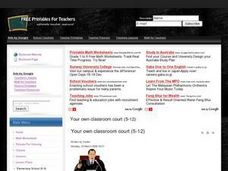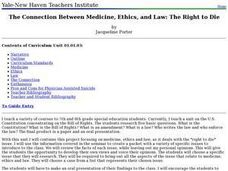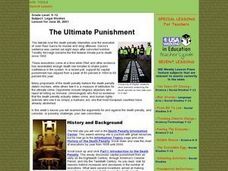Curated OER
How A Bill Becomes Law
Students gain an understanding of how a bill becomes law. They access websites imbedded in this plan. They create a bill of their own, and share it with the class. They compare their simulated bills with real legislation.
Curated OER
Arrest- A Legal System Simulation
What would your class do if a police officer arrested a student in class? This is exactly the anticipatory set that gets pupils engaged in a unit on the legal system. The plan is to get the officer to simulate an arrest, and then guest...
Curated OER
Individual Rights at School
Students understand that disputes over law and individual rights touch all phases of daily life, even athletic and recreational activities
Curated OER
Your Own Classroom Court
Students role play a court with lawyers, a judge, jury, and more. In this classroom court lesson plan, students review rules of the law in the judicial system.
Curated OER
How government Works
Students read to understand the process of lawmaking. In this lawmaking instructional activity, students define vocabulary and create an organizer showing the law making process. Students role play the various people involved in the...
Curated OER
4th grade social studies review
In this geography worksheet, 4th graders answer multiple choice questions about laws, Native Americans, geography, and more. Students complete 25 questions.
Facing History and Ourselves
How Do Rules and Traditions Shape Communities?
Sixth graders explore the concepts of laws and customs in a community, examining the reasoning behind rules. Then then collaborate to write their own classroom code of conduct.
Curated OER
Utah's Legislative Branch: How a Bill Becomes a Law
Seventh graders discover how a bill becomes a law in Utah. In groups, they decide on a law they would like to see enacted and discuss its chances of being passed by the legislative branch in Utah. They hold elections in which each...
Curated OER
What Is the Nature of Science?
Students distinguish between scientific and everyday meanings of key words-theory, hypothesis, law, fact-and use in context. They recognize the variables that affect observation, data collection, and interpretation. They discover the...
Curated OER
You and the Law -- Beating the Odds
Students examine the rate of institutional racism in the United States. Individually, they write in their journals about how they can make better choices and increase their self-esteem. Using historical documents, they identify the...
Curated OER
A Clone of Your Own: The Legal Issues and the Future of Genetic Engineering on Humans
Twelfth graders define cloning in their own words and examine the different types of cloning. After reading an article, they summarize it in their own words and use the internet to research the history of cloning. In groups, they...
Curated OER
The Connection Between Medicine, Ethics, and Law: The Right to Die
Students in a special education class examine the United States Constitution. Using the text, they answer five research questions and discuss the amendments that concern medicine, ethics and law of the right to die issue. They develop...
Curated OER
Racism, Discrimination, and the Law
Seventh graders examine the various racism and discrimination faced by various ethnic groups in the United States. In groups, they research the legal system and describe the purpose of the United States Constitution. They review cases...
Center for Civic Education
Constitution Day: What Basic Ideas are in the Preamble to the Constitution?
Young scholars investigate the document of the Constitution as part of a national day of recognition. The lesson plan uses many different activities to dissect the national document to increase student awareness of how the Constitution...
Curated OER
Law & Ethics for Photojournalists
Students identify and discuss First Amendment rights, examine how to make sound legal judgements regarding photographs of private individuals, examine difference between public and private figures as far as libel law is concerned,...
Curated OER
Safe Driving Solutions
Students act as commissioners researching needed safety standards for vehicles and highways. They then draft recommendations to be included in a new highway safety bill. They cite reasons a particular measure would reduce fatal highway...
Curated OER
TE Activity: Pollution Politics
Students examine how a bill becomes a law in the US Congress. They investigate legislation about global warming. They determine the role of engineers as they educate Congress, the public and other government institutions about global...
Curated OER
TE Activity: Environmental Interactions
Students design a web that shows the interactions between the living and non-living parts of the environment. They determine what an environment is and how engineers work together to solve problems. They complete a tally chart that they...
Curated OER
Federal and State Laws on Hazardous Waste
Students examine how laws on hazardous waste is developed and enforced. They work together to discover how statutes are passed as well. They complete an activity to end the lesson.
Curated OER
Above the Law: Athletes in Trouble
Students watch segments of "Unforgiveable Blackness" in class. They analyze Jack Johnson's problems with the law and the legal trouble of other athletes today. They create a set of standards they believe athletes should follow.
Curated OER
How a Bill Becomes a Law
Students examine Article I, Sections 1, 7, and 8, of the U.S. Constitution and discuss the authority and restrictions placed on the Congress in making laws.
Curated OER
The Ultimate Punishment
Students discover information about the death penalty debate. They explore the history of the death penalty and how it has changed over time. They examine supporting and opposing viewpoints of the issue.
Curated OER
Criminal Law -- Miranda
Young scholars examine the law and the Miranda rights. They role play members of law enforcement and ones being arrested.
Curated OER
Law School vs. School Laws
Students discuss the military's "Don't ask, don't tell" policy regarding sexual orientation and restage the debate leading up to the recent decision in Rumsfeld v. FAIR. They write essays evaluating the merits of the decision.

























